| کد مقاله | کد نشریه | سال انتشار | مقاله انگلیسی | نسخه تمام متن |
|---|---|---|---|---|
| 2132280 | 1086682 | 2007 | 17 صفحه PDF | دانلود رایگان |

Id-1 (inhibitor of differentiation or DNA binding-1) has been positively associated with cell proliferation, cell cycle progression, and invasiveness during tumorigenesis. In addition, Id-1 has been shown to modulate cellular sensitivity to TGF-β1 (transforming growth factor β1). Here we demonstrate a novel role of Id-1 in promoting TGF-β1-induced cell motility in a non-malignant prostate epithelial cell line, NPTX. We found that Id-1 promoted F-actin stress fiber formation in response to TGF-β1, which was associated with increased cell–substrate adhesion and cell migration in NPTX cells. In addition, this positive effect of Id-1 on TGF-β1-induced cell motility was mediated through activation of MEK–ERK signaling pathway and subsequent phosphorylation of HSP27 (heat shock protein 27). Furthermore, Id-1 disrupted the adherens junction complex in TGF-β1-treated cells through down-regulation of E-cadherin, redistribution of β-catenin, along with up-regulation of N-cadherin. These lines of evidence reveal a novel tumorigenic role of Id-1 through reorganization of actin cytoskeleton and disassembly of cell–cell adhesion in response to TGF-β1 in human prostate epithelial cells, and suggest that intracellular Id-1 levels might be a determining factor for switching TGF-β1 from a growth inhibitor to a tumor promoter during prostate carcinogenesis.
Journal: Experimental Cell Research - Volume 313, Issue 19, 15 November 2007, Pages 3983–3999